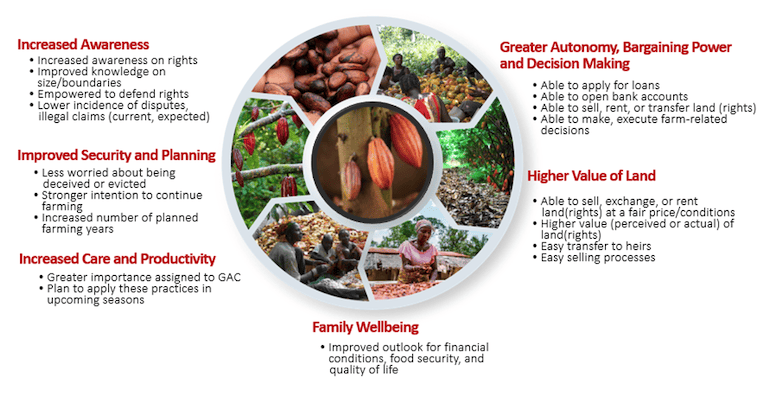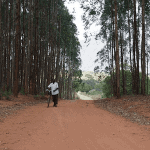Sweeter Prospects for Cocoa Farmers: A Recent Study Shows How Formal Land Rights Improve the Financial Outlook for Smallholders in Cote d’Ivoire
Cocoa is one of the world’s most prized foods, but the smallholder farmers who produce it are living in extreme poverty. The entire supply chain in Cote d’Ivoire, where 45% of the world’s cocoa is sourced, receives only about 6% of the revenue from chocolate. A recent survey by FINCA, on behalf of our investee, Meridia, found that smallholder households in cocoa-producing communities in Cote d’Ivoire live on less than 60 cents a day per capita — well below the global poverty line of $2/day.
Making matters worse, cocoa farmers often have a very precarious relationship with the land they depend on. Lack of formal land rights can affect locally indigenous communities as well as the descendants of migrants from other regions or nearby countries. More broadly, land tenure and property rights are increasingly seen as critical for eliminating poverty, due to the role of land in enabling prosperity, food production and housing. Stronger property rights can strengthen farmers’ hold over their main asset and create opportunities for leveraging it through credit, improving their financial health and resilience.
Environmental concerns add another dimension to the issue. In theory, farmers with stronger land rights should be more motivated to invest in sustainable farming practices, like planting shade trees, renovating their farms, and providing better care for their trees and soil. This can also mitigate deforestation, which is largely driven by cocoa production in Cote d’Ivoire.
To address this issue, Meridia established the Cote d’Ivoire Land Partnership (CLAP), together with the Ivorian Rural Land Agency, the German Federal Ministry for Economic Cooperation and Development (implemented by GIZ), and a consortium of global chocolate companies including Hershey, Unilever and Barry Callebaut’s Cocoa Horizons Foundation. Other industry members, such as Cargill, Ferrero, ETG and ECOM, have joined CLAP since its inception. The partnership aims to help smallholder farmers secure formal documentation of their land rights. Commissioned by CLAP, FINCA’s Research and Data Science team is constructing an evaluation and monitoring system to measure the partnership’s social impact. Working with Audace Institut Afrique, a local research firm, we recently completed a baseline survey of farmers within the CLAP target area and comparable districts. Even at this early stage, we found some encouraging signs that CLAP’s activities are starting to affect how farmers think about their land — and their hopes for the future.
Changing Attitudes — and Behavior — Around Land Rights
The starting point of our impact assessment was a comprehensive theory of change for CLAP, which we derived from expert interviews and relevant publications (see Figure 1 below). Because the ultimate outcomes, like improved farming practices, will depend on future actions by the farmers themselves, we started by looking for signs that CLAP’s land titling activities are producing positive attitudes that will lay the foundation for behavioral change over time. Among these activities are increased awareness of rights and boundaries, less incidence of (expected) disputes and illegal claims, less fear of being evicted, and improved (perceived) security. Any of these improvements in perception will strengthen smallholders’ motivation to make longer-term investments and adopt better farming practices, eventually enhancing their families’ wellbeing.
The current arrangement of informal land tenure is especially harmful for women, who are culturally regarded as farm laborers, with no property or inheritance rights of their own. Raising awareness and broadening women’s access to legally-backed land documentation could potentially help them combat this form of oppression, which perpetuates gender inequality from one generation to the next.
Figure 1. The short-to-medium term impact of sensitization and land tenure services on sustainability and wellbeing of cocoa farmers.

Source: FINCA’s Research and Data Science Team
We also believe that land tenure will provide farmers with greater autonomy and decision-making power. Taking control of their land and farming decisions can increase their dignity and confidence in their future and their children’s heritage. The formalization of property rights also has the potential to improve social relations, with neighbors working peacefully on their lands regardless of origin — instead of falling into conflict over who is the true owner of these properties.
Baseline Data Shows Promise for Better Financial Health
Our baseline survey covered 626 cocoa farmers in the early stage of CLAP’s program, along with a control group of 405 farmers from comparable areas. The results offer some interesting insights into the challenges these smallholders face, and their hopes regarding the potential benefits of land security. It was interesting — but perhaps unsurprising — to see that the most prominent initial results relate to perceptions about their financial health.
Even though they retain an extremely small portion of its market value, the households we surveyed rely on cocoa proceeds for 80% of their household income, which still leaves them well below the international poverty line. On such a tight budget, a family’s essential needs take priority, with little to nothing left over for investments in their land. Only 20% of the farmers we interviewed had sufficient resources for diversifying their crops, or other sources of income to improve their livelihoods.
With no disposable income, credit is the only viable option for investments. And indeed, the survey showed that the overwhelming majority of those who were able to access loans in previous seasons believed that credit had been very helpful to their endeavors. However, only a very small percentage of farmers (16%) had enough assets to qualify for loans. Knowing these obstacles, three-fourths of the farmers believed that their land would not serve as collateral for loans, and only one in five said they had a bank account. These results show why farmers find themselves in an impossible situation: They don’t have the income or assets to qualify for a loan, which prevents them from making the very investments that could improve their situation.
In this context, we found that even the prospect of potentially qualifying for a loan can significantly raise farmers’ hopes for a better future. Using extended regression models, we found that the first stage of land titling activities generated a statistically clean and profound impact on the expectation that formal land documentation will open future access to credit. The share of farmers who thought land documents would help them access loans was 14 percentage points higher in the treatment group, which is directly attributable to CLAP’s activities. This outcome aligns well with another significant indicator: expected improvements in the family’s overall financial situation. The percentage of farmers stating a positive change in expectations regarding their financial situation was 13% higher in the treatment group — again, directly attributable to CLAP’s awareness-raising and mapping activities.
We observed other effects, but with less statistical significance — such as farmers’ reduced fear of being evicted from their plots. These were corroborated by other promising but not yet significant indicators, such as the formulation of future plans to fertilize, prune or apply pesticides — actions farmers are less likely to take if they expect to eventually be evicted from their land. Other indicators are consistently and directionally positive, including improved processes for transferring land rights, increased value of the land itself, long-term planning and overall family wellbeing. In the follow-up survey round, which will take place in mid-2024, we might find that these impacts have increased after the formal land documents are delivered.
But regardless of what additional impacts we may discover, these initial findings, coming so early in the titling process, are encouraging. If CLAP’s efforts to strengthen land rights measurably improve conditions among cocoa farmers in Cote d’Ivoire, it’s possible that other initiatives may have a similar impact in other countries and industries.
Scott Graham is Vice President for Research and Data Science, and Anahit Tevosyan is Director of Research at FINCA International.
Photo courtesy of FINCA International.
- Categories
- Agriculture, Finance



